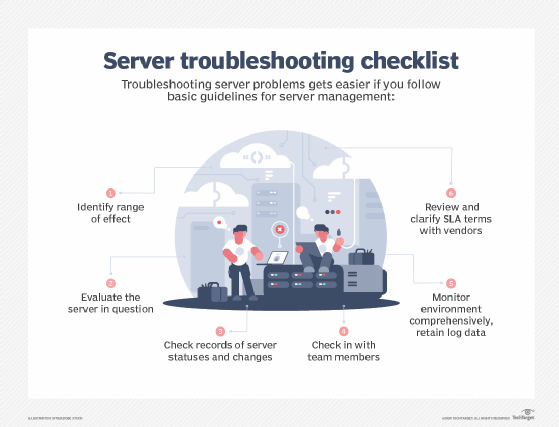systems operator (sysop)
What is a systems operator?
In IT, a systems operator (sysop) is a person who runs computer servers and other devices on a daily basis in a data center.
A related term is systems administrator, also known as a sysadmin. In larger data centers with multiple computer systems, network devices and peripheral equipment, sysadmin responsibilities can include managing security and user access, while a sysop monitors consoles and handles routine data center infrastructure operations. In smaller computer systems, such as Unix systems, the systems administrator and systems operator might be the same person.
What does a sysop do?
A systems operator's main job is running and monitoring the performance of various systems in a data center control center. They also handle numerous other jobs, including the following:
- Troubleshooting problems.
- Mounting and dismounting backup tapes.
- Replacing hard disk drive units.
- Inspecting equipment racks for any problems.
- Monitoring heating, ventilation and air conditioning systems in the data center.
- Granting employees and guests access to the data center.
- Managing data storage and data management systems.
- Assisting with system testing and diagnostics.
- Supporting disaster recovery and cybersecurity programs.

Some sysops manage networking functions as well. This includes supporting the internal local area networks and wide area networks that connect the organization to the internet, cloud resources, virtual private networks and other remote network services.
Importance of sysops and sysadmins
Data centers and other IT infrastructure facilities are complex. They're sensitive to temperature and humidity, and dependent on uninterruptible power supply systems and secure networking resources.
Sysops with appropriate training and experience are valuable. They're responsible for ensuring the IT infrastructure is available and secure. Their activities include installing, commissioning and decommissioning systems; performance monitoring; troubleshooting; recommending changes to improve performance; and reporting on system conditions.
Without sysops, many systems and resources in a data center wouldn't be managed or monitored. This could result in problems that escalate out of control. Sysops are often the first line of response when a malfunction occurs. They usually report to sysadmins or other data center managers. People who start in a systems operator job can move up on a career path to a sysadmin position and other higher-level supervisory and DevOps job titles.
Sysops in energy industries
The Federal Energy Regulatory Commission (FERC) oversees the United States' energy generation systems, particularly providers that move energy resources on an interstate basis. Under FERC regulations, an independent system operator (ISO) is the generic name for a utility company that transmits power generated by natural gas, oil and electric systems.
Power transmission system operators in ISOs manage the flow of energy across the power grid from generating stations to distribution points, such as substations. They also operate the generation systems, monitor the systems that oversee energy production, examine charts and other data to identify possible problems, and start or stop generating devices as needed.
Learn more about the entry-level certifications and training for systems operators in our career guide.








